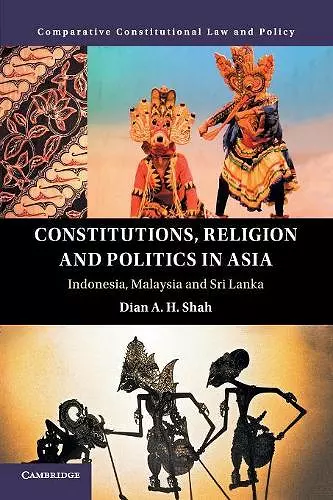Constitutions, Religion and Politics in Asia
Indonesia, Malaysia and Sri Lanka
Format:Paperback
Publisher:Cambridge University Press
Published:21st Feb '19
Currently unavailable, and unfortunately no date known when it will be back
This paperback is available in another edition too:
- Hardback£105.00(9781107183346)

Shah uncovers the complex interaction between constitutional law, religion and politics in three key plural societies in Asia.
Constitutions, Religion and Politics in Asia presents a detailed comparative study on how constitutional clauses on religion operate in three religiously plural societies. Shah explains the origins of these clauses and examines how they have been interpreted and enforced, demonstrating the unintended and adverse consequences on religious freedom.As religious polarisation in society deepens, political actors and policy-makers have begun to struggle with questions on the role of the dominant religion and how religion influences constitutional commitments and development. By focusing on Indonesia, Malaysia and Sri Lanka, Constitutions, Religion and Politics in Asia demonstrates how constitution-making and the operation of constitutional arrangements involving religion cannot be separated from the broader political dynamics of society. Although constitutions establish legal and political structures of government institutions and provide tools for rights protection, they do not operate in a vacuum divorced from the games of power and the political realities surrounding them. Here, Shah sets out how constitutions operate and evolve, and demonstrates how constitutional provisions can produce unintended consequences over time. A vital new source of scholarship for students and scholars of law and religion, and comparative constitutional law, and those interested in issues of constitutionalism and legal and political history in Asia.
'This book contains highly sophisticated and detailed comparative legal research. It uncovers the historical context in which constitutional religious freedoms came into being in Indonesia, Malaysia and Sri Lanka to explain how this informs modern day interpretation and application of these freedoms. It offers a very convincing explanation for the violation of religious freedoms in these countries, despite constitutional protections, examining a variety of issues including electoral processes, judicial decision-making and broader political contexts.' Simon Butt, Sydney Law School
'In this incisive and revealing comparative analysis, Dian A. H. Shah tracks the experience of three religiously plural societies with religious freedom. She unearths the origins of their constitutional clauses on religion, showing how they were intended to provide robust guarantees for all religions, and then explains the unraveling of these guarantees in practice. Close linkages have developed between majority religions and the state, to the detriment of minority faiths, and neither constitutional text, nor judicial review, nor political remedies has proved to be availing for minorities. Exploring with great care the affinities and disparities among her three cases, the author paints a discerning portrait of majority rule out of balance and the conundrums this creates for constitutionalists. This book is a signal contribution to comparative law and politics.' Donald. L Horowitz, James B. Duke Professor of Law and Political Science Emeritus, Duke University, North Carolina
'In an increasingly post-secular world, we are keen to ask how religion should be dealt with as a matter of constitutional status and fundamental rights. We are also keen to know how religion influences constitutional development over time. These questions loom in complex and pressing ways, everywhere, but in Asia, with its historic religious pluralism, divided societies and varied political contexts, there is much experience on these issues which we should learn. Dian A. H. Shah has produced a highly original book discussing these issues and how they have been approached in three critical countries: Indonesia, Malaysia and Sri Lanka. I cannot commend this book highly enough for its profound insights and its impressive, knowledgeable and careful analysis of these three important cases.' Andrew Harding, National University of Singapore
'This is a learned work on constitutional approaches to religious freedom. The author provides an incisive study of the constitution-making process in three deeply divided Asian polities. Their differing approaches to and models of constitutionalizing religious freedom are put forward as possible lessons for other fragmented societies. At the same time, we are alerted to the gap between theory and reality; the impact of electoral politics and religious nationalism; the link between religion and ethnicity; and the role of non-state actors in diminishing society's commitment to religious pluralism. Ultimately a Constitution is what happens, and the author shows that a bill of rights and an independent judiciary are not the bulwarks they are expected to be. This book may encourage further studies on the formulation of 'religion clauses' and the design of judicial institutions.' Shad Saleem Faruqi, Tunku Abdul Rahman Professor of Law, University of Malaya
ISBN: 9781316634752
Dimensions: 230mm x 153mm x 15mm
Weight: 500g
305 pages